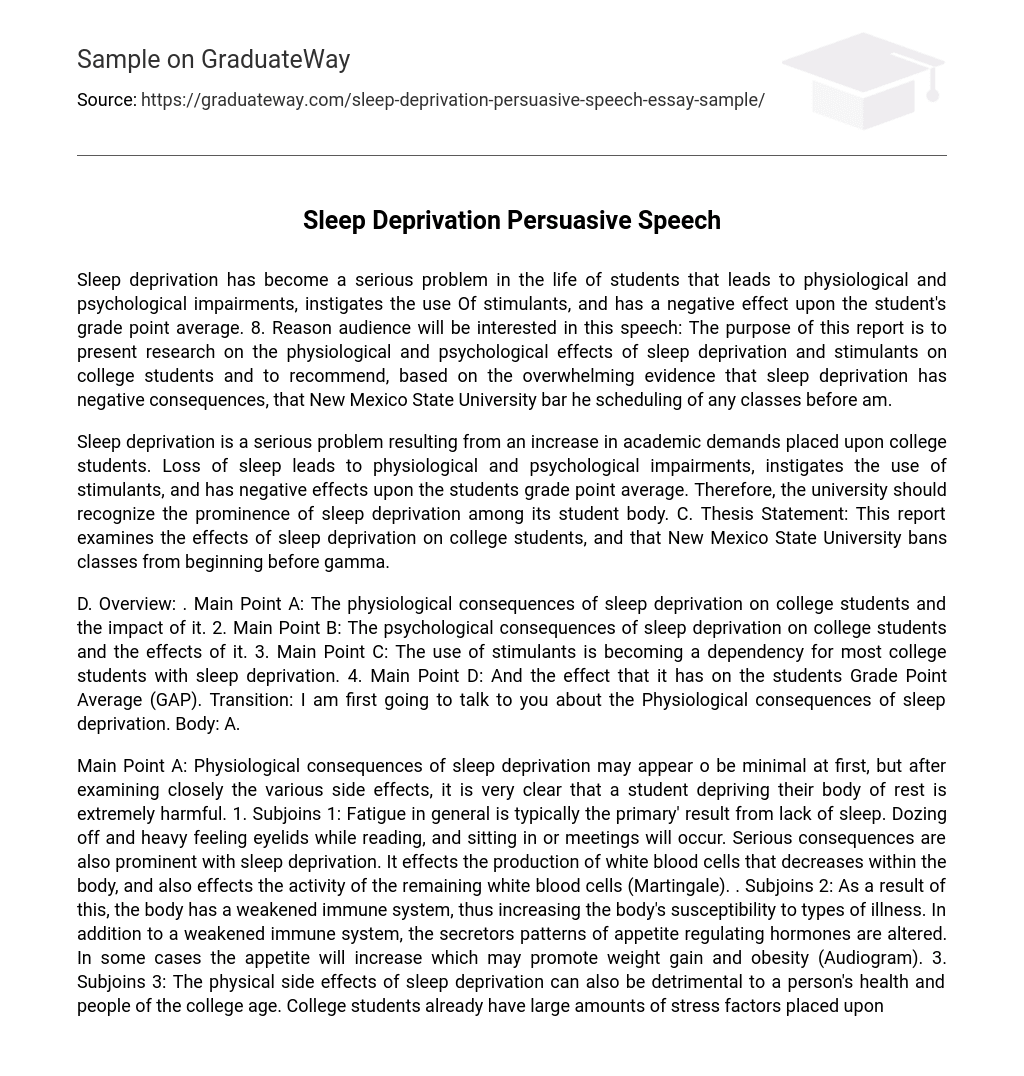Sleep deprivation has become a serious problem in the life of students that leads to physiological and psychological impairments, instigates the use Of stimulants, and has a negative effect upon the student’s grade point average. 8.
Reason audience will be interested in this speech:
The purpose of this report is to present research on the physiological and psychological effects of sleep deprivation and stimulants on college students and to recommend, based on the overwhelming evidence that sleep deprivation has negative consequences, that New Mexico State University bar he scheduling of any classes before am.
Sleep deprivation is a serious problem resulting from an increase in academic demands placed upon college students. Loss of sleep leads to physiological and psychological impairments, instigates the use of stimulants, and has negative effects upon the students grade point average. Therefore, the university should recognize the prominence of sleep deprivation among its student body. C.
Thesis Statement:
This report examines the effects of sleep deprivation on college students, and that New Mexico State University bans classes from beginning before gamma.
D. Overview:
Main Point A:
1.The physiological consequences of sleep deprivation on college students and the impact of it.
2. Main Point B:
The psychological consequences of sleep deprivation on college students and the effects of it.
3. Main Point C:
The use of stimulants is becoming a dependency for most college students with sleep deprivation.
4. Main Point D:
And the effect that it has on the students Grade Point Average (GAP).
Transition:
I am first going to talk to you about the Physiological consequences of sleep deprivation. Body: A.
Main Point A:
Physiological consequences of sleep deprivation may appear o be minimal at first, but after examining closely the various side effects, it is very clear that a student depriving their body of rest is extremely harmful.
Subjoins 1:
Fatigue in general is typically the primary’ result from lack of sleep. Dozing off and heavy feeling eyelids while reading, and sitting in or meetings will occur. Serious consequences are also prominent with sleep deprivation. It effects the production of white blood cells that decreases within the body, and also effects the activity of the remaining white blood cells (Martingale).
Subjoins 2:
As a result of this, the body has a weakened immune system, thus increasing the body’s susceptibility to types of illness. In addition to a weakened immune system, the secretors patterns of appetite regulating hormones are altered. In some cases the appetite will increase which may promote weight gain and obesity (Audiogram).
Subjoins 3:
The physical side effects of sleep deprivation can also be detrimental to a person’s health and people of the college age. College students already have large amounts of stress factors placed upon them.
Any physical ailments immediately inhibits their ability to concentrate, learn, and retain material.
Therefore, the physical consequences of sleep deprivation are directly linked to the psychological effects.
Transition:
The next effect is the psychological effect. A. Main Point B: unlike psychological effects the psychological consequences of sleep deprivation have the most significant impact upon a college student. These effects are directly related to how well the student retains, learns, and recalls class material. 1.
Subjoins 1:
The most common psychological effects include increase anxiety, impaired concentration and memory retrieval, irritability, depression, moodiness, and slow thinking time (Martingale).
Subjoins 2:
Those people who deprive their bodies of less than six to seven hours of sleep per night impair their psychosomatic performance, and unrecognized thinking, such as a reduction in attention, concentration, critical thinking, and memory.
Subjoins 3:
Many of these effects can cause a student’s academic performance to diminish, resulting in a poor grade point average (Audiogram).
Nevertheless, academic demands influence students to find ways to ignore and repress the signs of sleep deprivation.
Transition:
The ways that students repress sleep deprivation is by using Stimulants. A.
Main Point C:
For a college student the most common way to repress the signs of sleep deprivation is through the consumption of stimulants. For student caffeine is typically the preferred stimulant to use because it is cheap and easily accessible in various products. But the product of choice are energy drinks. 1.
Subjoins 1:
Energy drinks are designed to give the consumer an energy kick through a combination of B vitamins, caffeine, amino acids, herbal extracts, and sugar offshoots. However, the amount of caffeine in these drinks are incredibly high. One energy drink typically notations 80 to 141 milliards of caffeine per eight ounces, this is the equivalent of two twelve ounce cans of caffeinated soda.
Subjoins 2:
Consuming large amounts of caffeine, such as an energy drinks, is detrimental to the consumer’s (in this case Students) health.
Cardiovascular, central nervous system, renal dysfunctions, gastrointestinal, and chronic headaches are all associated with consuming caffeine regularly, yet college students still do it. According to Mammalian’s’ study, 67% percent of college aged consumers dictated that insufficient sleep was their reason for misusing the highly caffeinated drink. The kick of energy provided by the drinks aids students in concentration and increases their alertness, which allows a brief improvement of mental functioning (Mammalian’s).





